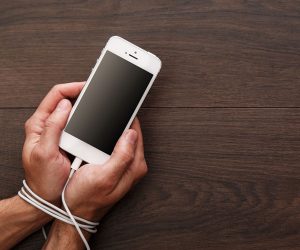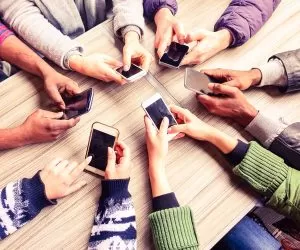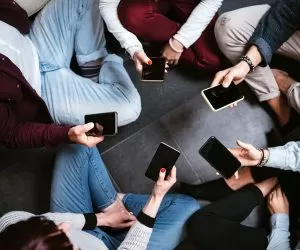15 Recent Discoveries From Phone Addiction Studies
Do you know the long-term health risks linked to phone overuse? You will be shocked when you see the list. More about that below…
Up until a few years ago no one ever gave any real consideration to the idea of smartphone or cellphone addiction.
The smartphone was not quite as popular as it has become in the recent past and now that there are millions of people around the world using smartphones all of the time, the scientific community has taken more of an interest in just how the phone is being used and if there are people that might be considered to be actual phone addicts.
While none of the studies being conducted as of yet can really be seen as scientifically conclusive because they have not gone on for a long enough period of time, some of the facts that have been uncovered regarding smartphone addiction are quite startling, making people take pause in regards to their phone use.
Here are 15 recent discoveries from phone addiction studies that raise some interesting and eye-opening ideas regarding phone addiction today.
Contents
1. There are differences in regards to gender in terms of phone addiction

Studies have been conducted regarding smartphone addiction and have noticed that there are differences in terms of addiction when it comes to men and women.
Some studies have shown that women and men, while equally capable of becoming addicted to smartphone use over time, do seem to become addicted to different aspects of the phone for their use.
Women are more likely to spend more time using social media, texting and reading while men are more likely to get addicted while using their phones for watching videos and movies and surfing the Internet.
2. Phone addiction is more likely to occur among youths than adults

While no one may really be surprised by this discovery in any study, it does raise a few points that many have long considered regarding technology and smartphones.
Youths are more likely to grasp the intricate uses of all the features of a smartphone and pick up on trends a lot faster than most adults, making them more likely to spend more time using the phone for different reasons.
Also, most adults may not have the free hours during the day due to commitments like work and other relationships while youths are more willing to devote time to using the phone, leading to more use, more tolerance of the device, and then longer use to get the feelings of satisfaction they desire out of using the phone.
3. Studies have shown that phone addiction can have a negative impact on communication skills

This has proven to be true for both adults and youths that overuse a smartphone.
Because they are spending so much time using their smartphones and operating in a very solitary world where there only interactions may occur over text messages and other messenger services, people are becoming less and less able to communicate appropriately and properly with other people.
This can have long-term effects not just on the culture and future generations but it can have an impact on the way people interact socially and work, having vast effects overall.
4. There are possible long term health risks linked to phone addiction

While there is nothing conclusive as of yet because smartphones and cellphones have not been in regular use in the culture for a long enough period of time as of yet, there are studies that have shown some possible long-term health effects that can arise from the overuse of smartphones.
These health risks can range from the fairly subtle and benign, including things like neck and back pain and strain, to issues dealing with Carpel Tunnel Syndrome from repetitive use to even more serious possible effects involving links to cancer due to overexposure to the chemicals and microwaves used in the use of cellphone technology.
There are still a number of factors that need to be determined but early feedback on some studies does indicate there are real risks that can arise when the phone is used too much.
5. Phone addiction can lead to financial problems

There have been a few sociological studies conducted regarding the excessive use of smartphones and cellphones and the type of impact it can have regarding the finances of a person or family.
There are some indications that an addiction, just like an addiction to drugs or alcohol can, can have an adverse financial effect on a person.
Many people get caught up in the use of their phone and end up going over their usage limits in terms of minutes or data, leading them to rack up very large bills on a monthly basis that can lead to all kinds of financial hardships like falling behind on other bills so that you can pay off a phone bill.
When this happens regularly, it is easy to find yourself falling deep into debt quickly just so you can keep up with your phone bill.
6. Phone addiction can lead to issues with self-esteem

Several studies have shown that people who find themselves addicted to using their phones often do so because they have issues with their own self-esteem.
The indication seems to be that those who may not think that highly of themselves and their particular standing in their peer group, at work, at school or at home tend to let themselves get more wrapped up into using their smartphone as a form of comfort.
The phone allows them to feel better about whom they are and does not judge them in any way so that they can feel better and more in control when they are using their phone.
Of course, there is a downside to this as the addiction can make self-esteem even worse as the person becomes more reliant on the use of their phone.
7. Those with a phone addiction can suffer greater anxiety when there is a loss

While it is true that no one likes to suffer through the loss of their phone for a variety of reasons, some studies have shown that people who are overly reliant on their smartphones go through even more anxiety and angst when they lose their phone, even if the loss is just for a few minutes.
Since they have built up a strong attachment to their phones it can be difficult to overcome any type of loss and leave the addict feeling frustrated, stressed and confused.
They will feel a strong level of anxiety until the issue is resolved and this can go as far as effecting how they are able to function day-to-day without the phone.
8. Phone addiction does have an impact on sexual behavior

It has been discovered that people who are excessively using their smartphones may have less of an interest in sexual activity and a highly diminished sex drive.
Studies indicate that because the person may be using their smartphone so much as a form of not just entertainment but almost as a sort of lifeline to the world that the person may have no real interest in engaging in any type of sexual behavior or may only want to do so very infrequently.
This can cause a great deal of stress among couples where one party may have a phone addiction and spends all of their time using the phone instead of engaging with their partner.

This has become evident on several levels but may be more prominent with youths and young adults.
Those who have a phone addiction may spend hours using various forms of social media, so much so that the use begins to interfere with regular school work and activities or with their job.
They place a higher value on staying current with what is going on in their social media world than they do in doing homework, taking care of chores, completing projects for work and school, meeting deadlines and other factors that make them productive.
10. Studies have shown that phone-zones are likened to non-smoking areas and make addicts feel stigmatized

While phone-free zones are still a relatively new occurrence in places such as movie theaters, restaurants, bars, museums and other public arenas, they are becoming more and more visible as businesses find that other customers find constant smartphone use to be a distraction and nuisance.
Studies have indicated that smartphone users, particular those that might be considered addicts, see these zones much in the same way that smokers have always viewed non-smoking zones.
The addicts may feel like they are being singled out and ostracized for their use and that there is a stigma attached to what they are doing.
11. Phone addicts may experience Phantom Vibration Syndrome

This is also something that is fairly new and still being studied, but there are studies going on that show that people who use their smartphones excessively may experience what has come to be known as Phantom Vibration Syndrome.
This means that they can feel their phone vibrating, indicating someone is contacting them or they have received some type of notification, even when nothing is really happening to their phone at all.
This can be a clear indication that a person has become too reliant on the use of their phone and wants something to be happening all of the time so that they have a reason to pick up the phone, check it and use it, even if the reason is not really there.
This is similar to feelings that addicts of all kinds may suffer from at some point.
12. Studies show that phone addicts may have poorer listening skills

For a person that makes use of their smartphone all of the time, they may become so wrapped up in what is going on in their smartphones that they lose focus and do not pay attention to anything else that may be going on around them.
This can lead to very poor listening skills and prevent them from engaging in any type of meaningful conversation when they are face-to-face with a person.
These poor listening skills can be a detriment to them when it comes to school, work and personal relationships and affect their overall performance in all areas.
13. Phone addicts are more likely to suffer from sleep deprivation

this fact is one that has been noted since early on in the use of smartphones.
Studies and surveys have long shown that people that use their smartphones for many hours a day can suffer from insomnia and sleep deprivation.
They are more likely to spend many hours in front of their smartphone screen, even while in bed, which can affect their brain’s ability to relax properly so that it can shut down for the night and go to sleep.
14. Studies show that phone addicts build a tolerance to use and need more use to get satisfaction

As is often the case with any type of addiction, tolerance levels can be built up over the course of time which can require more and more use by the addict in order to achieve that pleasant feeling and feeling of relaxation that they have come to expect through use.
While this is very common among those who abuse drugs and alcohol, studies have also shown that this occurs with people who are addicted to smartphones.
Users require longer lengths of time to be satisfied with their phone use and each time needs to be longer and longer so that they can feel happy about their time spent.
15. There is an argument over whether to list phone addiction as a disorder or an addiction

In the scientific community there is still an argument going on as to whether a smartphone addiction is really an addiction or a disorder.
At this time, it is not really classified as an addiction condition much in the way drugs, alcohol, sex and gambling can be classified as an addiction and it is still seen more as a disorder, but this may have more to do with the fact that there has not been a long enough time to allow for proper in-depth studies to occur.
Smartphone addiction is something that is going to be studied for years to come so that science can discover more about the phenomenon and see just what may be at the root cause of a person developing this type of addiction.
While studies continue and treatments still are being discussed and rationalized, for now it seems up to the individual himself or herself to decide if they have a smartphone addiction problem and what can be done to help them curb it.










3 Comments Add one
what gets me -it is absolutely ignorance of person, who is constantly texting next to you,no matter it is business meeting, or just friends gathering. That person would be lying, pretending he or she is there. Lying to hide. Same like alcoholics or drug users. And if you mention that their behavior out of hands- they for sure will be pissed with you.
this is horrible
This is really scaring…